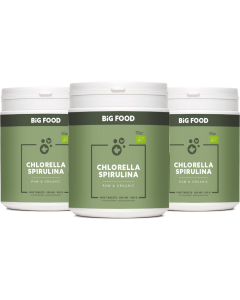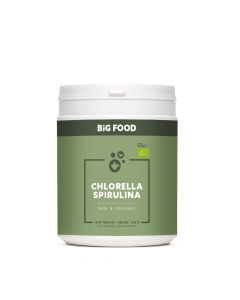-
 Big Food - Organic Chlorella Spirulina - 500g / 1000 Tablets (500mg) (3 jars deal)Out of stock€ 84.02
Big Food - Organic Chlorella Spirulina - 500g / 1000 Tablets (500mg) (3 jars deal)Out of stock€ 84.02
€ 98.85(Starting at € 84,02 p/u)
- Shipped today!
- Free shipping from € 45
- Postpay possibility
- Review score 9.4
- Earn reward points
- Shipped today!
- Free shipping from € 45
- Postpay possibility
- Review score 9.4
- Earn reward points
- Home
- Superfoods & Mushrooms
- Algae & Greens
- Spirulina


What is Spirulina Powder?
Our spirulina is organic and 100% natural without any added ingredients. The algae superfood is delicately ground into a very fine powder, in a way that best protects the following nutrients:
Protein
Spirulina is composed of 55-65% of complete protein. This makes it one of only a few plant-based sources of complete protein that provides all nine essential amino acids. In addition, the digestibility of this protein is over 80% which is rare for plant foods.
The digestibility of food is an indicator of how much protein will be absorbed and used in the body. Typically, the digestibility of plant foods is lower around 60-70% while animal sources are 80-90%.
Phycocyanin
The blue streak in spirulina comes from the pigment phycocyanin. This is a deep blue pigment that assists algae in photosynthesis by trapping light. In fact, this antioxidant compound is one of the main components in spirulina! The healthful compound has potent antioxidant and anti-inflammatory effects on the body. And early studies have shown that it can provide protection to the liver and kidneys.
Carotenoids
Carotenoids are a special class of plant compounds with potent antioxidative effects on the body. Spirulina contains source several of these including zeaxanthin, beta-carotene, and chlorophyll. These compounds collectively scavenge and quench harmful reactive molecules that accumulate in the body and cause damage.
One study showed that the carotenoids in spirulina were much more bioavailable than those in spinach.
Iron
Spirulina is naturally rich in iron, which has been shown to contain a relatively high bioavailability compared to other plant-based sources. Iron is a mineral that is incorporated into hemoglobin, the oxygen-transport cells of our body. It is essential for the efficient delivery of oxygen to all tissues and thus, energy production.
In one study, iron supplementation improved hemoglobin oxygen saturation and immune function in older adults with a history of iron deficiency (anemia).
Minerals
Each small teaspoon provides a healthy dose of magnesium, zinc, copper, and manganese. These are all essential cofactors in over 300 chemical reactions in the body and contribute to the maintenance of the nervous system and cardiovascular health.


